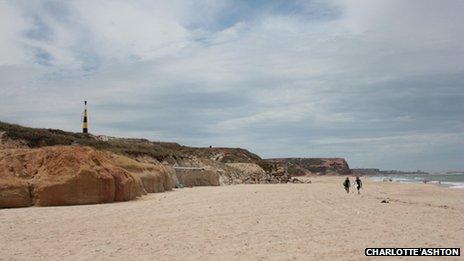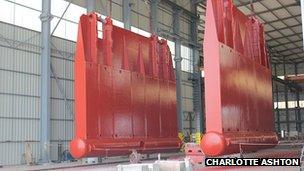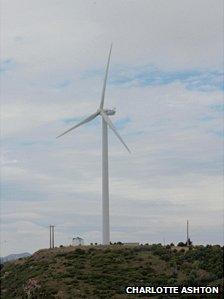Could Portugal ever run entirely on green energy again?
- Published

The waters off the coast of Peniche are home to Portugal's latest green initiative
Portugal is a world leader in renewable energy. More than half its energy comes from wind, solar and hydro power. But as the country struggles through a record recession will their sustainability drive ground to a halt?
For a few glorious hours at the end of 2011, Portugal's entire electricity need was met by renewable sources of energy.
They have the world's largest solar farm, Europe's largest wind farm and extensive hydro-electric dam infrastructure.
And in the Atlantic waters off the coast of Peniche, 62 miles (100km) north of Lisbon, scientists hope to achieve another first in sustainability.
Finnish energy company AW Energy is days from fixing its WaveRoller machine to the ocean floor.
Three fibreglass panels, 100 sq m (1,076 sq ft) each in size, will swing back and forth with the motion of the waves on hinges attached to control stations anchored to the ocean floor.
The energy this movement generates will feed into Portugal's national electricity grid.
"We need this kind of activity in Europe. There are so many places this technology could be deployed," says project manager Jussi Akerberg.
"In my dreams one day the sea will replace the oil field."
"If we can provide Portugal with the means to utilise its huge coastal energy resource there will be jobs in energy production, maintenance and the sale of the energy itself," Mr Akerberg says.
And jobs are what Portugal most desperately needs - unemployment is above 15% and rising.
But the country already has more renewable energy than it can use.
There are hours during the night when the amount of electricity generated by renewable sources exceeds demand, so the surplus goes to waste.
If consumption by Portuguese households was more consistent, less precious energy would be captured in vain.

These giant doors will use wave power to swing back and forth to generate electricity
"We have the most extensive network of public electric vehicle charging points in Europe," says Prof Paulo Ferrao who runs the energy initiative at Lisbon's top engineering and technology university, IST.
"If there was a large number of electric vehicles in the country it would contribute a lot to storing energy during excessive periods. For example during the night when the wind blows a lot and there is not enough demand."
"But we are just waiting for them to become affordable," says Prof Ferrao.
Subsidies for electric vehicles - and domestic solar panels - have been cut by the current Portuguese government.
They have slashed public spending in order to meet the conditions of the austerity agreement signed with the IMF and European Union last May in return for a 78bn euro (£63bn) bailout.
But Prof Farrao says there are changes people could make for free to make better use of the country's renewable energy infrastructure.
IT start-up company Watt-IS has developed software that analyses data transmitted by smart electricity meters, which are already being installed by utility companies around Europe.
Thirty million UK households will have them by 2019.
It produces individual reports for every household detailing exactly how the owners could save electricity - and therefore money.
It might tell you to defrost your fridge more regularly, to turn your TV off standby or to put your washing machine on at night, when electricity is cheaper in Portugal.
"If every household in Portugal adopted these measures we'd avoid 700 gigawatt hours of consumption, which is more than one of the most under-utilised power plants in Portugal.
"In the UK they're planning to phase out one quarter of their thermal power plants and substitute them for new ones this could also lead to the avoidance of new power plants being built," says Watt-IS co-founder Miguel Carvalho.
Consumers' heightened need to save money makes Watt-IS' service very attractive. But the financial crisis also means that this small start-up is finding it difficult to attract funding.
"If we could learn from the US and improve the overall entrepreneurial environment, it would be easier.

Portugal has a vast wind turbine infrastructure
"At the moment this country has 15% unemployment, the number of unemployed graduates has doubled to more than 115,000. So this sort of company, which needs highly skilled people could be very important indeed," adds Carvalho.
The potential here in Portugal for sustainable growth is as significant as the progress it has already made.
But could other countries replicate their progress?
Manuel Pinho led the infrastructure investment drive in 2005 as minister for economy and innovation.
He now lectures at universities in the US and China and says the financial crisis makes investment in renewable technology very unlikely.
"Most of these projects are financed on a long-term basis so they're very sensitive to interest rates and with the cost of capital in southern Europe it would be unrealistic," says Mr Pinho.
In the US Professor Pinho says the low price of natural gas makes wind power uncompetitive, but he adds that heavy investment in Brazil and China gives him reason for hope.
Indeed one of China's state owned energy companies, Three Gorges Corp, has just bought a 21% stake in Portugal's biggest power producer, which was up for grabs in the recent sell-off of state-owned assets here.
Some reason for hope perhaps that the sustainability lessons from Portugal will not drown entirely in these stormy economic seas.
- Published4 June 2012